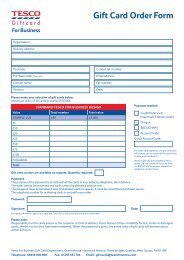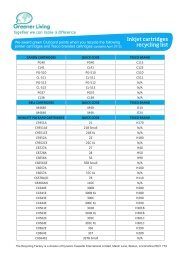Preparing for Pregnancy - Tesco
Preparing for Pregnancy - Tesco
Preparing for Pregnancy - Tesco
Create successful ePaper yourself
Turn your PDF publications into a flip-book with our unique Google optimized e-Paper software.
Using hormones<br />
Are hormonal<br />
contraceptives<br />
right <strong>for</strong> you?<br />
✔Hormonal contraceptives<br />
are very reliable providing<br />
they are used properly.<br />
✔They don’t interfere with sex.<br />
Yes<br />
✔They’re under the woman’s control.<br />
✔They can help with painful periods or PMT.<br />
✔Some hormonal contraceptives can protect<br />
against pelvic infections, fibroids, cysts and<br />
some types of cancer.<br />
The Pill<br />
There are two sorts. The progestogen only<br />
pill (POP or mini pill as it used to be called)<br />
contains the hormone progestogen and is<br />
taken every day without a break. The other<br />
is the combined pill (COC) which contains<br />
both oestrogen and progestogen and is<br />
taken <strong>for</strong> three weeks (21 days) out of<br />
every four. During the fourth week when<br />
no pills are being taken a woman will have<br />
her 'pill period' known as a withdrawal<br />
bleed. Some combined pills are known as<br />
Everyday (ED) Pills as they are packaged<br />
with a week of placebo (or dummy pills) to<br />
use in week four. These are helpful <strong>for</strong><br />
women who are worried about<br />
remembering to start a new pack of pills<br />
after the week off. They are in every other<br />
way identical. There are many brands of<br />
combined pills.<br />
Implant<br />
A small tube about the size of a hair grip<br />
is placed under the skin and releases<br />
progestogen over three years. It has<br />
all the advantages of the pill.<br />
10<br />
FAMILYPLANNING<br />
✗ She’ll need to see a doctor or<br />
nurse in order to get them.<br />
✗ They may alter periods - which<br />
does no harm but can be annoying.<br />
✗ Some women may get side effects;<br />
though you can always change to<br />
another hormonal method.<br />
✗ If a woman has certain medical<br />
conditions, or wants to avoid the risk of<br />
certain conditions, she may not be able<br />
to use some hormonal contraceptives.<br />
Check with the doctor.<br />
✗ Hormonal contraceptives don’t protect<br />
against sexually transmitted infections.<br />
Unless both of you have been tested,<br />
you’ll need to use a condom.<br />
No<br />
Injection<br />
A hormonal injection slowly releases<br />
progestogen into the body - the effects last <strong>for</strong><br />
up to 12 weeks. There’s no need to remember<br />
to take pills! But if there are side effects, they<br />
last <strong>for</strong> 12 weeks too - and after injections are<br />
stopped, it may take a while to conceive.<br />
Patch<br />
A small thin patch is stuck on the arm,<br />
stomach or bottom, to release oestrogen<br />
and progestogen. Don’t worry, it won’t slide<br />
off; it’s waterproof! It needs renewing each<br />
week - but one advantage is that it can be<br />
used to postpone the monthly ‘bleed’.<br />
IUD and IUS<br />
The copper IUD and the progestogen IUS<br />
are small devices that are fitted in a woman’s<br />
womb by a doctor or nurse to prevent<br />
pregnancy. They may be uncom<strong>for</strong>table to fit<br />
and there might be a risk of infection around<br />
the time of insertion. They are very reliable,<br />
reversible and the IUD is effective <strong>for</strong> 3-10<br />
years (depending on type), while the IUS is<br />
effective <strong>for</strong> 5 years.<br />
Who can help?<br />
Hormonal contraceptives are free<br />
on prescription, from a GP or family<br />
planning clinic. <strong>Tesco</strong> Pharmacies are<br />
open every day <strong>for</strong> prescription<br />
fulfilment. Some private organisations<br />
also offer paid-<strong>for</strong> advice and<br />
contraception.<br />
Talk to your GP or practice nurse about<br />
which of these may be the right choice<br />
<strong>for</strong> you.<br />
11<br />
FAMILYPLANNING<br />
None of the<br />
contraceptive<br />
methods on this page<br />
protect against<br />
sexually transmitted<br />
infections.<br />
Forgetting<br />
If you know you may <strong>for</strong>get to<br />
take the pill each day, this isn’t<br />
the method <strong>for</strong> you!<br />
If you’ve missed a pill or vomited,<br />
use an extra contraceptive method<br />
like a condom. Certain antibiotics<br />
may also affect the pill’s reliability<br />
so alternative contraception may<br />
be required. The pill packet will<br />
have further instructions on what<br />
to do - or pop in and ask at your<br />
<strong>Tesco</strong> Pharmacy.










